The Lakeside Expo Center buzzed with coding, conversations, and collaboration on Saturday where 75 students were challenged to push the boundaries of AI and develop solutions to real-world challenges.
For 12 hours, 20 teams came together to identify issues and leverage the opportunities provided by generative AI. A panel of judges evaluated the projects based on criteria such as innovation, impact, and scalability.
Lokesh Ramamoorthi, a lecturer in computer engineering and the event organizer, reflected on the submissions and expressed interest in solutions centered around patient-centric applications, emphasizing the potential for rapid implementation using existing AI advancements.
That’s exactly what biomedical engineering students Emma Grace Craig and Robert Cancio did to win first place in the healthcare track. Their project looked to fill a void in physical therapy programs.
“Thirty-four million patients receive poor physical therapy treatment every year,” said Craig. “We developed the app REMMA to use artificial intelligence to monitor, guide, and adjust home exercises for physical therapy patients remotely. AI is a transformative tool that can be used to better our healthcare system.”
Similarly, finalist Nate Joseph, a computer engineering major, and his team sought to rectify biases in medical texts by training an AI model on a diverse dataset.
“To solve this issue, we trained a new dataset with 2-dimensional x-ray inputs that are classified based on demographic data,” said computer engineering major Nate Joseph. “Our AI model’s output is a 3-dimensional version of the x-ray using MedNeRF technology which eliminates the need for CT scans and allows physicians to view the scanned organs in augmented reality.”
Other ideas and tools generated by the finalists included an AI-powered market sentiment analysis application for informed investment decisions, a sign language interpretation app fostering communication for individuals with hearing impairments, and a multi-organ imaging recognition and anomaly classification system.
As students hacked their solutions, keynote speakers from both industry and academia shared valuable insights into the burgeoning field of AI. Burham Sebin, Head of Research at Venture Miami, underscored Miami's emergence as a hotbed for entrepreneurial ventures, emphasizing the transformative potential of AI in shaping the future. Interactive media lecturer Lorena Lopez guided students through the process of building paper wireframes for rapid prototyping, highlighting the importance of user experience design in product development.
The inaugural hackathon was made possible by scientist and entrepreneur Jonathan Rothberg, with the intent of inspiring the next generation of innovators.
“Events like these celebrate the boundless potential of artificial intelligence,” said Ramamoorthi. “Innovation thrives under collaboration.”

